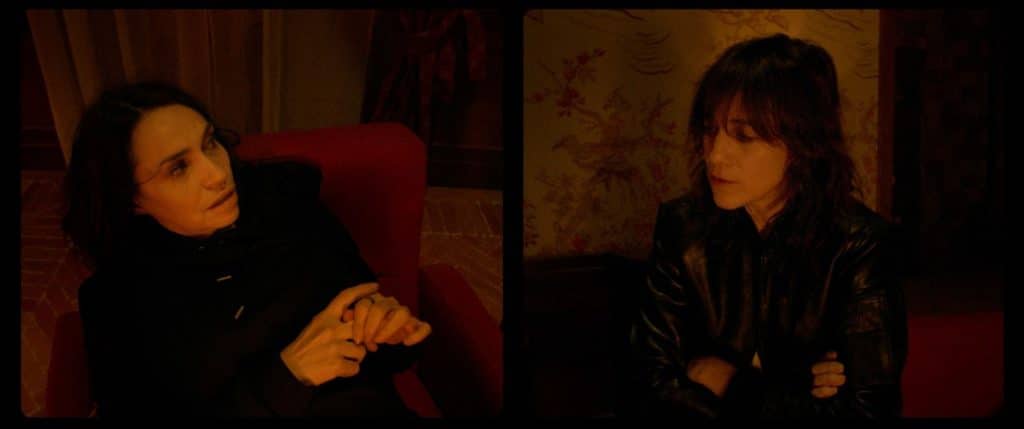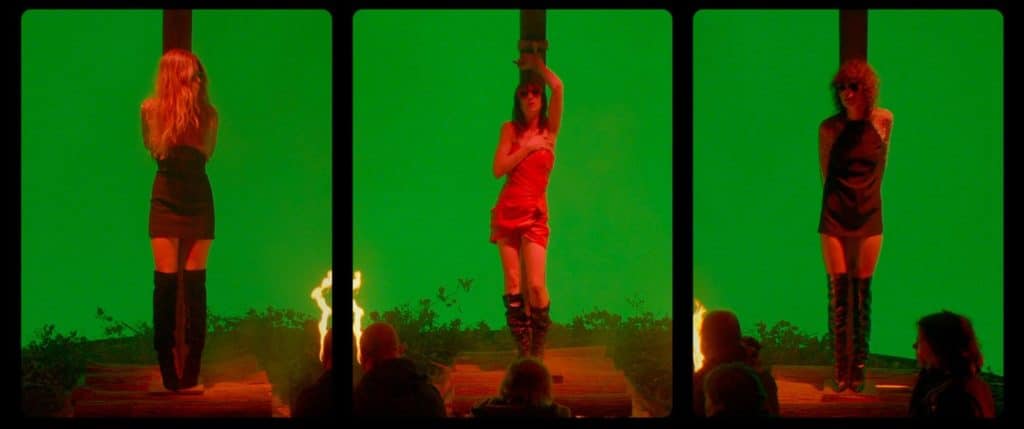Read also:
How to Watch FX Live Without CableHow To Watch AMC Without CableHow to Watch ABC Without CableHow to Watch Paramount Network Without CableGaspar Noé serves up another slice of cinematic provocation, but this time feels a bit too self-indulgent in its supernatural metaness.
“It’s not politics. It’s poetry!” one of the many voices screams approximately half an hour into Lux Aeterna (stylized, of course, as Lux Æterna). With that line, Gaspar Noé’s 51-minute movie—now available on digital three years after its 2019 Cannes Film Festival premiere—reaches the self-awareness at which it often paws. That opener is partly a joke in and of itself: Noé’s auteur work has relatively veered toward the quote-unquote apolitical. The politics, inherent as they are to the art of cinema, have fleshed themselves out by accident. Here, the spontaneous “poetry” of Lux Aeterna—an extrapolation of sorts of his previous film, Climax—lives on a prosaic approach.
Béatrice Dalle is the director of God’s Craft, a film about witches. Charlotte Gainsbourg is her lead. The two talk about previous roles, lovers, and their relationships to Christianity through a static split-screen setup in lieu of a shot/reverse shot. The two hold an extemporaneous nature that’s welcoming enough for the film. Then, as they talk about their coworkers, Béatrice warns, “I’m nice. I respect people. But if you piss me off… it all vanishes.”
Enter Karl Glusman, pestering people for involvement in his directorial debut. Oh, and Abbey Lee’s just arrived to set for her supporting role and, at no fault of her own, hasn’t a clue what’s happening. A producer (Yannick Bono) and the cinematographer (Maxime Ruiz) scheme to usurp Béatrice’s command of the set; she grows incensed with the process and all involved. Such builds to God’s Craft’s climactic burning at the stake while a paparazzo (Ken Yasumoto) gets whatever shots of the blossoming failure he can, shown POV-style.
This sort of thing occurs for more than the first half, much of it using DP Benoît Debie’s split-screen to track separate goings-on. But here, Noé’s approach to mayhem diverges from his past in one way: it’s comparatively muted, opting for an approach that’s sparse in aural or visual overstimulation — the ensuing bedlam registers as chatty. Debie and Noé’s attention to spatial awareness remains intact, but the shorter runtimes means this gimmick feels less consequential. It’s not that Lux Aeterna is a fast movie, per se; it feels exactly like 49 minutes sans credits.

And that’s perfectly fine, at least in retrospect. In real-time, the script feels like a vomit of tenuously-related setpieces, devoid of any pathos or thematic tissue that exists of their own accord. Whatever points the film grasps about the perennial patriarchy of film sets feel insipid considering its relatively flat gender dynamics. Then there’s the moment where Charlotte’s young daughter relays an incident between her and two boys at school over the phone. It’s not that it’s offensive, per se; it’s far too extraneous for that. By the climax, when multicolored strobe lighting drowns the final 10 minutes, the overload doesn’t so much elicit as it does hit you over the head.
The diptych and triptych visuals seemingly exist to compress the runtime as much as they serve as stylistic choices. Interspersed quotes from Jean-Luc Godard, Carl Theodor Dreyer, and Rainer Werner Fassbinder function as reference points—nay, bullet points. And yet, Lux Aeterna reveals itself as a rebuttal to auteur theory, maybe by accident. Are such decisions blatant enough to double as metatext when read next to the film’s misanthropy and the near-artlessness of many of its characters?
Perhaps, but such a perspective hinges on one’s predilection toward not taking the film too seriously. It’s hard to believe it takes itself too seriously either; it holds an ambivalence that rings as curious. Clips of Häxan and Day of Wrath introduce the picture. The end credits conclude with a quote from Noé himself: “Thank God I’m an atheist.” The movie summarizes its own existence as a joke, a rejection of the assumed religious experience of cinematic creation. Past the nihilism and bouts of spirituality in Noé’s filmography thus far, this furthers itself into a banality that, despite its tendency to underwhelm, solidifies its philosophy enough.
Enough—that’s the key word. It’s a fitting one, given that it’s hard to get much out of Lux Æterna until after it ends. Everyone in the movie, after all, plays a fictional version of themselves.

To call it an empty experience is apt—surprising, even. Then, you circle back to the movie’s start. “You are all in good health, but you cannot imagine the supreme happiness an epileptic feels in the moments before a fit. I would perhaps give my whole life in exchange for a few seconds of that felicity,” Fyodor Dostoevsky’s quote opens. For a film to open with needs lofty enough to border on divine and to immediately conflate such ephemerality with cinema is not brilliant. It does, though, allow Lux Aeterna to set itself up for knowing failure as it eats its own tail.
It all replays in the mind, even if it isn’t great. As the disappointments pile on, it’s only by the end that you register a quote from Godard that Noé references eight minutes in: “Most filmmakers today are like the living dead and their films are just like them.” By the end, the onscreen menagerie is that living dead, with no real result to show for their troubles. Noé’s the same, self-effacingly remarking on his own nature as a filmmaker. “The filmmaker is the man who must leave his signature on a film intended as a work of art,” Dreyer’s quote reads, just before everything falls to hell. It’s almost as if such a creative hierarchy is a farce, even in a Noé film.
Lux Aeterna is prosaic, but that’s not an insult. It also doesn’t totally register as a movie, but that’s not a criticism either. (A lot of things don’t; just consider how swaths of footage here come from a paparazzo.) It’s an essay, even if it isn’t the manifesto it yearns to be. Its characters are more punctuation than semiotics. That level of divinity going into a movie? That’s a letdown, and there’s no single person (or God) on set to guide it. At this point, all Noé the auteur can do is look back and say, “Thank God I’m an atheist.”
Lux Aeterna is currently available on demand, with a Blu-ray release coming this summer.